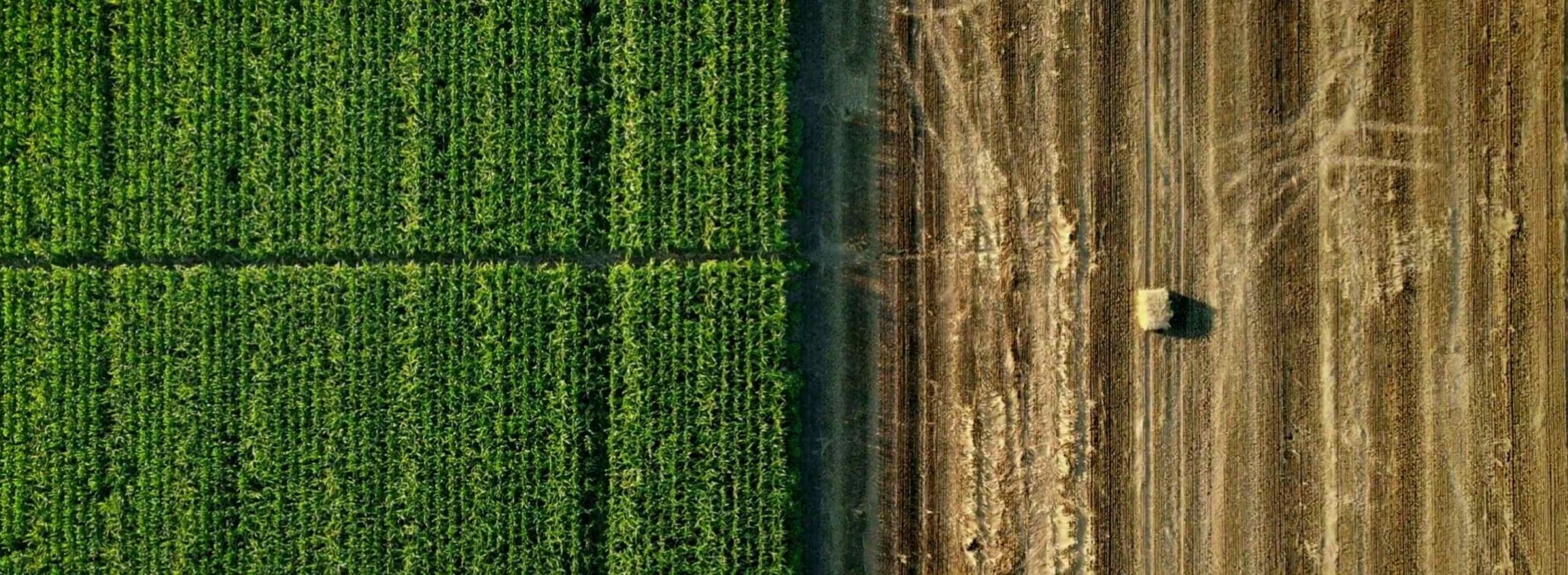Michigan State University scientists, from their labs on campus to the fields of farmers in Michigan and beyond, are creating a roadmap to feed the world.
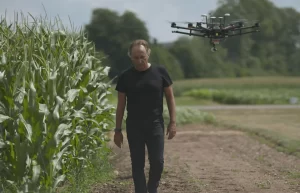
It’s not without challenges. The obstacles include climate change, shrinking land suitable for growing crops and an unrelenting demand for food to fortify a booming population that is expected to require a doubling of crop production by 2050.
Those are the headwinds Michigan farmers face even as the state’s growers produce more than 300 commercial commodities, lead the nation in many crop yields and have the second-highest overall agriculture diversity in the country. The Michigan Department of Agriculture and Rural Development also reports the state’s food and agriculture industries employ roughly 800,000 workers and make a $105 billion economic impact annually.
But MSU’s quest for innovation and the ability to leverage technology are developing sustainable solutions that increase crop yields, improve nutrition and produce higher levels of resistance to crop threats. The findings are at the forefront of a rapidly changing industry with a thirst for the knowledge Spartan scientists offer.
The drive for progress and the results play out across MSU’s College of Agriculture and Natural Resources and the College of Natural Science, where interdisciplinary teams of researchers and students are breaking new ground and performing transformative work across the state, exemplified in part by:
- Bruno Basso, John A. Hannah Distinguished Professor, implementing strategic methods that boost the yields of Michigan farmers while also controlling their costs.
- Federica Brandizzi, a University Distinguished Professor, using technology to help plants grow larger, stronger and more productive.
- Addie Thompson, a plant geneticist in MSU’s Plant Resilience Institute, leading the charge to prevent disease from potentially devastating maize crops in the United States.
The dedication to solving agricultural challenges, the quality and depth of the research and educating the field’s next wave of scientists has consistently earned MSU the designation of being among the
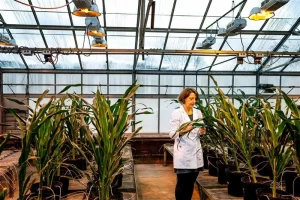
top 15 universities in the world for agriculture and forestry.
Kelly Millenbah, the dean of the College of Agriculture and Natural Resources, said the honor is reflective of Michigan State’s impressive work to serve Michigan communities and beyond.
“First and foremost, we measure our success by our impact — by the students we educate, by the partners we support and by the fields and forests that benefit from our research efforts,” Millenbah said.
“We’ve been doing this work since 1855, which means that we’re part of a powerful unbroken chain of researchers and educators. And that extends beyond institutional knowledge and into a shared commitment to passing along what we learned from our own mentors. This isn’t just a privilege, it’s an obligation: to give what we have been gifted.”
Michigan State, since its founding as an institution dedicated to advancing scientific agriculture, has a deep history of pushing boundaries and infusing innovation in the field, while also developing the next generation of industry leaders.

That practice continues with the June 2022 approval of a new state-of-the-art Plant and Environmental Science Building and the state’s July 2022 funding that provided MSU $53 million for upgrades to the Plant Science Greenhouses and Dairy Cattle Teaching and Research Center. The research conducted inside these campus centerpieces will provide Michigan farmers with state-specific insights into soil, climate, pests and weeds. The ambitious vision will create new spaces for discovery and the ability to bring together top researchers and enhance agricultural education.
The facility expansions also broaden the societal impacts both from a global perspective as well as an intensely local outlook that helps drive Michigan forward.
“It’s important that MSU’s researchers and educators lead in that space because that is our shared future,” Millenbah said. “Farmers will be feeding a growing global population under increasingly unpredictable circumstances, and to appropriately support them, we’ll need to bring the very best and brightest minds together and fund their innovative work.”
These scientists and their impact in Michigan cannot be understated, as evidenced by the agriculture industry’s direct financial implications and employment statistics that include:
- Agriculture supports more than 17,000 jobs in food processing, storage and transportation.
- Michigan is tops in the country in production of asparagus; cranberry and black beans; cucumbers; tart cherries; Niagara grapes and squash.
- Michigan families own and operate 47,000 farms on almost 10 million acres of land.
Digital prescriptions transform crop yield
MSU’s investment and support backing its researchers are critical to success, said Basso, who infuses technology into farming’s traditional architecture by using drones, planes and satellites to provide a prescription for what the crops need.
His team uses historical environmental data along with information about fertilizer application, precipitation and soil composition to deliver maps and a customized prescription that will increase yield and sustainability, thereby helping farmers grow their profits. The prescription also preserves Michigan’s natural resources and protects its water sources.
“(Farmers) are excited when we tell them how we integrate all of these pieces of information into a turnkey solution that they have been waiting on for years,” Basso said. “Farmers take a big risk when they make decisions, and by giving them prescription maps of different inputs, we help them understand their risk. We are transforming the way they farm the fields to a win-win solution driven by profitability and environmental sustainability.”
The technology, first adapted by farmers in Michigan, is scalable for growers of all sizes and is being used across the globe. Basso has worked with the United Nations to develop a crop yield forecasting system for countries around the world.
“The goal of any scientist is to make a positive impact and create a benefit for the future,” he said. “That is happening at Michigan State.”
‘Trying to make plants more valuable to humans’
Very few scientists can stake a claim to working both on terrestrial and cosmic spaces, and Brandizzi, who is in MSU’s Department of Plant Biology, is among that select group with her efforts to understand how plants adapt to environmental stresses.
Her team is focused on making plants bigger and more productive by modifying the cell walls to be more malleable and to store soluble sugars. The researchers use non-food plant species and then
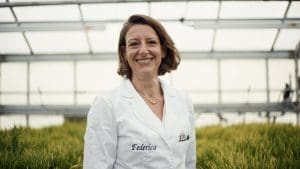
translate the findings to production crops, including alfalfa, sorghum and soybeans that can be grown locally in Michigan and around the world.
“We are trying to make plants more valuable to humans,” she said. “Plants are not limited resources, but the land is limited, the water we use is limited and the nutrients in the land can be limited. Eventually these resources could disappear, and we need to build the knowledge for tomorrow so that we can feed, clothe and produce materials necessary for life.”
While most of Brandizzi’s work applies to stretching what farmers are trying to achieve — strong crops with maximum nutrition — she’s also helping NASA determine how to feed a human presence on the moon. Her team sent fortified seeds into space in November 2022 to see how they will adapt to different stressors.
“This will be another bit of knowledge of what we can achieve,” Brandizzi said.
Brandizzi feels fortunate to be a part of MSU’s scientific achievements, and she sees a passionate group of researchers striving for the best.
“(As a whole) MSU wants to make a better future, and that’s the dream of everyone,” she said.
Concern for crops
When corn tar spot disease was first detected in the Midwest in 2015, Michigan State didn’t have a maize breeding specialist inside the Department of Plant, Soil and Microbial Sciences, but the addition of Thompson in 2018 rapidly pushed Spartan scientists to the forefront of the battle against the fungus.
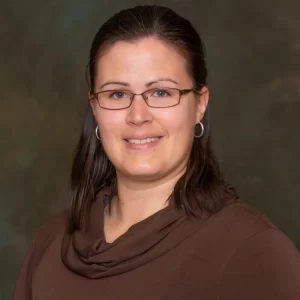
In July, the U.S. Department of Agriculture’s National Institute of Food and Agriculture awarded a Thompson-led project more than half a million dollars to study corn’s resistance to the disease. The research team brings in expertise from multiple MSU colleges to mitigate the damage and improve the resistance to existing varieties while also developing strains that are unlikely to succumb to tar spot.
Michigan corn growers experienced wet conditions that led to significant tar spot in 2018 and 2021, causing a loss of 50 to 100 bushels per acre. The research projects underway hope to mitigate the production drop as well as address tar spot in corn silage, which is used for animal feed on many Michigan dairy farms.
Managing this disease is one example of how MSU researchers are protecting the nation’s markets and ensuring a healthy and nutritious food supply. Michigan State’s role, whether fighting disease, balancing environmental impacts or turning back pests, is for society’s benefit, Thompson said.
Michigan’s corn crops cover 2.3 million acres and are tied with soybeans for the most extensive coverage in the state. More than 297 million bushels of corn grain, worth $1 billion, were grown in 2018, with export trade and in-state uses that include animal feed and ethanol production.
Through both public and private partnerships, the advances at MSU are directly implemented for the benefit of farmers and, ultimately the people who consume their crops.
“In agriculture, there are always issues that pose a threat to crops, and in many instances, we can apply what we find to a number of different issues,” Thompson said. “Michigan State is known for its plant sciences being cutting edge, and there are great people to collaborate with to solve problems.
“This is a huge opportunity and a huge challenge, and we have the benefit of taking the long-term approach and being agile as we learn more.”
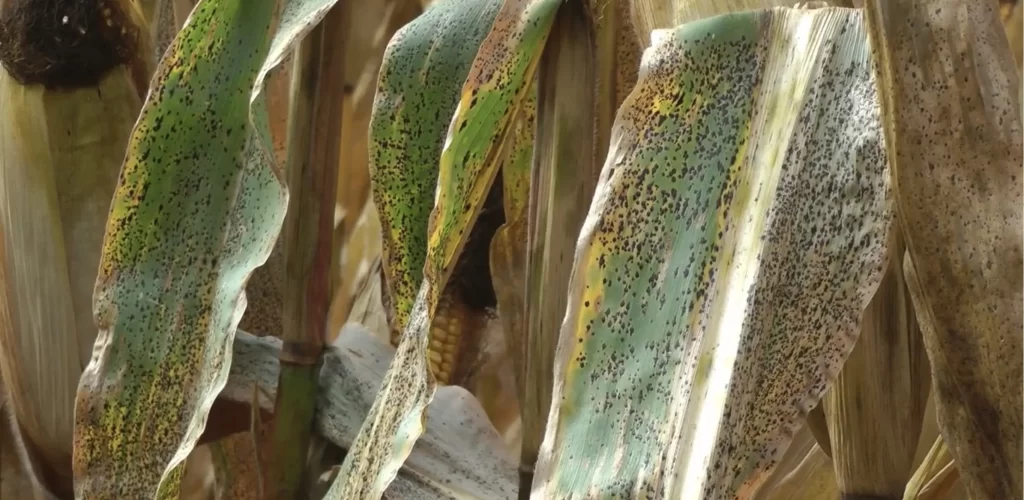
‘Second to none’
Millenbah, a 30-year veteran of the College of Agriculture and Natural Resources, offers that the work of scientists at MSU is “second to none” for the totality of their efforts to benefit Michigan farmers and the state’s consumers.
“The agricultural scientist Dr. Norman Borlaug said that ‘You can’t build a peaceful world on empty stomachs and human misery,’” Millenbah said. “Finding innovative ways to feed our growing global population is critical to ensuring not just that people can survive, but that they also can experience stability and happiness in their lives. I want people to know that MSU’s researchers are on the front line of that work, and they’ll be there for generations to come.”
This story was originally published on MSUToday.
About the MSU Innovation Center:
The MSU Innovation Center is dedicated to fostering innovation, research commercialization, and entrepreneurial activities from the research and discovery happening across our campus every day. We act as the primary interface for researchers aiming to see their research applied to solving real-world problems and making the world a better place to live. We aim to empower faculty, researchers, and students within our community of scholars by providing them with the knowledge, skills, and opportunities to bring their discoveries to the forefront. Through strategic collaborations with the private sector, we aim to amplify the impact of faculty research and drive economic growth while positively impacting society. We foster mutually beneficial, long-term relationships with the private sector through corporate-sponsored research collaborations, technology licensing discussions, and support for faculty entrepreneurs to support the establishment of startup companies.
Is your company interested in working with MSU’s agriculture researchers? Click Here.

